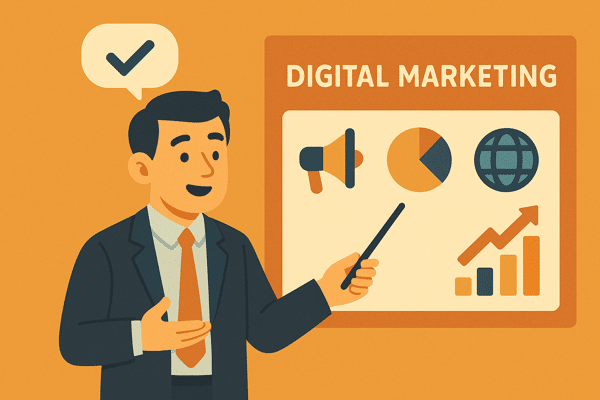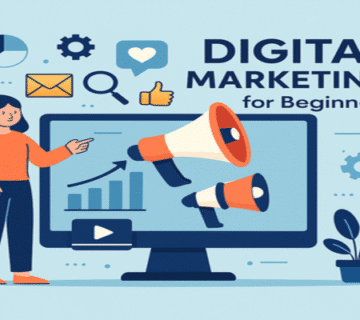The Importance of Digital Marketing in the Modern Era
Introduction to Digital Marketing
Digital marketing is a set of strategies and methods that use digital platforms to promote products and services. This concept has significantly evolved since its inception and now relies heavily on the internet and social media. Digital marketing enables companies to reach a global audience, marking a dramatic shift from traditional marketing, which relied primarily on print and broadcast media.
Recent years have seen notable changes in the way marketing strategies are executed. Thanks to technological advancements, companies now use big data and analytics to better understand customer behavior. This technical evolution has created a more interactive business environment, allowing real-time feedback that helps improve marketing campaigns. Digital platforms have also provided new opportunities to expand reach and increase customer engagement, making digital marketing an essential choice for brands.

Unlike traditional strategies that rely on direct, print, or television advertising, digital marketing offers continuous engagement through email, social media, and search engines. Brands can also measure campaign success more precisely with real-time performance data. Thus, a sound understanding of digital marketing is vital for businesses that aim to adapt and grow in today’s modern world.
Digital Transformation and Its Impact on Marketing
Digital transformation is a fundamental process that has significantly affected various aspects of individual and societal life—especially marketing. Technology has become a major factor in shaping consumer behavior and interactions. In the digital age, consumers no longer rely solely on traditional media for product and service information. Instead, they turn to the internet and social media as primary sources for research and purchasing decisions.
This digital openness has advanced marketing methods, with brands shifting to data-driven strategies. Marketers can now accurately track consumer behavior and preferences online. By analyzing big data, they can create personalized marketing campaigns that target consumers more effectively. As a result, marketing has evolved from random product promotion to a science based on consumer behavior analysis and well-crafted strategies.
Moreover, technology has accelerated information dissemination and accessibility, making consumers more aware of their options. This increases competition among brands, compelling companies to offer real value and unique experiences to stand out. Digital transformation is thus a decisive factor in shaping consumer-brand relationships, positively influencing profits and market participation.
Digital Marketing Strategies
Digital marketing is one of the core pillars through which many organizations aim to achieve success in today’s era. There are several digital marketing strategies that help enhance brand presence and achieve objectives. Among these, Search Engine Optimization (SEO) stands out as one of the most effective tools, helping websites appear on the first pages of search engine results, thereby increasing organic traffic. Using SEO requires deep knowledge of search terms, keyword performance analysis, and developing high-quality content tailored to user needs.
Social media marketing is also a powerful tool in digital marketing. Platforms like Facebook, Instagram, and Twitter provide opportunities for direct interaction with audiences and boosting brand awareness. This strategy requires creating engaging content, interacting with followers, and using paid ads to achieve tangible results. It is also important to measure and analyze campaign performance to continuously optimize strategies.
Email marketing is another indispensable strategy due to its proven effectiveness in customer communication. It includes sending customized campaigns to meet specific audience needs, thereby increasing conversion rates and boosting sales. Email content should be appealing and informative, aligning with the reader’s preferences and reflecting the brand identity.
To succeed, businesses must adopt an integrated approach that combines these tools and techniques to achieve the best possible results.
The Role of Data in Digital Marketing
In today’s digital era, big data plays a central role in how marketing campaigns are designed and managed. The vast amount of data collected from various sources—such as social media, websites, and mobile apps—can enhance marketing strategy effectiveness. Analyzing this data provides brands with deep insights into consumer behavior, enabling them to customize campaigns and improve results.
One of the key benefits of using data in digital marketing is the ability to better understand consumer behavior. By analyzing collected data, marketers can identify patterns and core interests of different customer segments. This allows them to craft targeted messages that align with each audience group’s needs, increasing conversion rates and sales. For instance, data analysis can reveal peak shopping times, enabling brands to present timely offers.
Data also helps optimize current campaigns. For example, analyzing past ad performance can reveal what works and what doesn’t, allowing for evidence-based decisions such as modifying content or retargeting audiences. In short, data can be a turning point in marketing success, as a deep understanding of the market and customers greatly boosts campaign effectiveness.
Challenges in Digital Marketing
Marketers face several challenges in the digital age that significantly impact their strategies and outcomes. One of the most pressing challenges is intense competition, with digital markets flooded with competitors targeting the same audience. In such a competitive landscape, marketers must innovate and be creative in their campaigns to achieve effective results. A clear and unique marketing strategy can help stand out from the crowd.
Data protection is another critical challenge, especially amid growing privacy and information security concerns. With strict regulations like the General Data Protection Regulation (GDPR) in Europe, companies must enhance data security and comply with laws. Marketers should develop transparent policies to protect customer information and build trust, fostering loyalty and boosting sales impact.
Additionally, changes in search engine algorithms greatly affect brand visibility. These changes pose a challenge that requires constant adaptation to new SEO standards. To maintain digital content visibility, marketers must stay updated on trends and best practices. By doing so, they can overcome these challenges and achieve success in a dynamic digital environment.
The Impact of Social Media
Social media has become a core element in modern digital marketing strategies, playing a major role in enhancing communication and engagement between brands and their audiences. In an increasingly competitive landscape, companies must leverage platforms like Facebook, Twitter, and Instagram to achieve their marketing goals.
Social media enables brands to reach a broad audience and increase awareness of their products and services. By providing engaging and interactive content, brands can build strong relationships with customers, enhancing loyalty and increasing the likelihood of converting them into long-term buyers. For example, companies can use paid advertising campaigns on various platforms to reach specific target audiences based on interests and behavior—improving marketing effectiveness and boosting success rates.
Additionally, the significance of social media lies in its ability to provide immediate customer feedback, allowing businesses to adjust strategies based on audience response. This real-time interaction helps brands respond to evolving customer needs, maintaining market presence more effectively. Social media also amplifies message reach through sharing capabilities, speeding up and broadening promotional dissemination.
In conclusion, social media is a powerful tool in digital marketing, supporting brands in achieving their goals and strengthening their market presence.
Choosing the Right Channels for Digital Marketing
In the ever-changing digital marketing landscape, selecting the right channels is a key part of any successful strategy. This choice heavily depends on business nature and target audience. For instance, small and local businesses might focus on platforms like Facebook and Instagram to attract nearby customers, while larger companies may prefer paid search engine ads to reach a global audience.
The first step in selecting the right channels is understanding the target audience. Companies should analyze audience characteristics such as age, location, and interests. Web analytics tools can be used to collect precise data that helps determine where the audience is most active online. This enables companies to choose the most effective channels, improving ad ROI and increasing engagement chances.
When deciding on channels, businesses should also consider the type of content they produce. If the content is video-based, platforms like YouTube and TikTok may be strategic choices. Conversely, if the content is primarily written, blogs and more traditional social media platforms might be more effective.
Ultimately, brands should test different channels and continuously monitor performance. Analyzing results and using data to evaluate effectiveness helps organizations refine their strategies and identify the most efficient channels. This is an ongoing process, as trends and behaviors evolve, making regular strategy adjustments essential for optimal outcomes.
Best Tools for Digital Marketing
In today’s modern digital marketing era, marketers must use the best available tools and software to enhance strategies and increase ROI. One of the most well-known tools is campaign management platforms like Google Ads and Facebook Ads, which allow users to create and manage advertising campaigns conveniently. These tools help target the right audience and increase conversion rates.
Additionally, analytics tools like Google Analytics play a crucial role in evaluating campaign performance and understanding user behavior online. By analyzing data, marketers can make informed decisions based on insights about visitors and sales, enhancing the effectiveness of their digital marketing strategies.
For SEO, tools like SEMrush and Ahrefs are ideal. These help marketers analyze keywords, monitor backlinks, and gain insights into competition. As website visibility improves in search results, organic traffic increases, leading to higher revenues.
Customer Relationship Management (CRM) tools like HubSpot and Salesforce are also essential for aligning marketing efforts with customer relationship management. These tools help collect and track customer data, enabling businesses to personalize customer experiences and support digital marketing strategies more effectively.
In conclusion, using a combination of these tools can boost operational efficiency and maximize ROI. By choosing the right tools, marketers can achieve remarkable results in the ever-evolving digital marketing world.





No comment